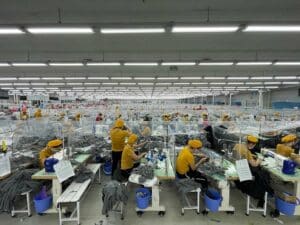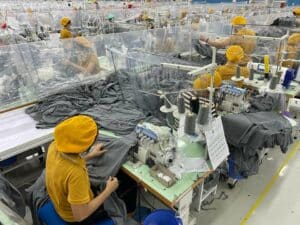More than half a million migrant workers left Ho Chi Minh City for their hometowns after the city eased COVID lockdowns in early October. National and international press have reported on the mass movements and workers’ reluctance to return to factories.
HO CHI MINH CITY, Vietnam, 22 November – Aiming to help alleviate the crisis for the apparel industry, Better Work Vietnam is training managers and workers to address the overall workforce hesitance to return.
“Better Work is supporting factories with trainings, providing managers and workers with soft skills to help them harmonize industrial relations, which are especially needed amid the current COVID-19 context,” says Better Work Vietnam Training Officer Le Bich Ngoc. “Factories are working on finding ways to recruit new workers and get back their workforce somehow.”

As Vietnam faces the fourth and most fatal wave of the COVID-19 pandemic, the production of businesses and the lives of workers continue to be greatly affected. A massive workforce shortage is still plaguing the textile and garment sector, although the situation is gradually improving and workers are slowly returning to work. Social distance measures are currently being lifted and vaccination campaigns are ramping up.
Ho Chi Minh City, the main industrial hub in the country’s south, and its provinces, have been Vietnam’s coronavirus epicentre, recording half of the country’s some 850,000 cases and 80% of its fatalities, data from the Health Ministry shows.
To guarantee continuity of production amid the string of lockdowns implemented across southern provinces in the summer, workers were asked not to leave the area and reside in the enterprise facilities.
Half of these garment factories chose this option, adopting the “3 on-site model” drafted by the country’s Ministry of Health. Its requirements focus on the safety and health of the workforce on the factory floor, in their rooms and during their breaks. Essentially, the model dictates that workers should work, sleep and eat onsite. Enterprises failing to abide by these guidelines have had to temporarily cease operations.
To provide critical support to enterprises affected by this COVID-19 wave, Better Work standardized and collated documents and guidance from the Government to serve as a reference called “Reference document on 3 on-site implementation” to the participating factories in accordance with legal labour requirements. Better Work Vietnam has tried to shed light on crucial concerns of workers’ safety and wellbeing, considering the challenges of the 3 on-site model.

Yet amid fears of infection, many workers, especially those who had lost their jobs, chose the safety net of their hometowns, with their families providing food and shelter.
Among enterprises affected by the strict social distancing decree of the Government, 40.9% have ceased operations, while 53.7% has implemented 3 on-site model but with only a minor part of their workforce, reported a September 2021 survey conducted by VITAS (Garment, Textile and Footwear enterprises issued by Vietnam Textile and Apparel Association) and Vietnam Leather, Footwear and Handbag Association.
Based on the Better Work Vietnam’s observations, factories that have established strong relations with their employees over the years, including implementing the updated labour law’s regulations, saw a higher number of workers staying in their jobs amid the crisis. Factories with good management-worker relations as a result of Better Work’s trainings and affiliation have also been more resilient in these difficult times.
“Dialogue among all parties is more crucial than ever to keep going at this point,” Bich Ngoc says. “Better Work is providing managers and workers with soft skills to help them harmonize industrial relations.”
Workers have received top priority for inoculations, which are provided by the Health Ministry. To restart the economy, Ho Chi Minh City’s vaccination rate has sped ahead of much of the country, reaching over 76% of residents, in comparison with the overall 22% across the country’s 98 million people.
Better Work, in coordination with the government, has been conducting seminars with factory managers throughout the health crisis. These courses help participants investigate and resolve grievances, while also identifying root causes of industrial disputes and understanding procedures for disputes under Vietnamese law.
“We conducted trainings about business continuity with some 500 participants so far,” says Better Work Vietnam Communications Officer Quan Hoang. “They are pivotal at the time of the pandemic when companies have to struggle to survive.”